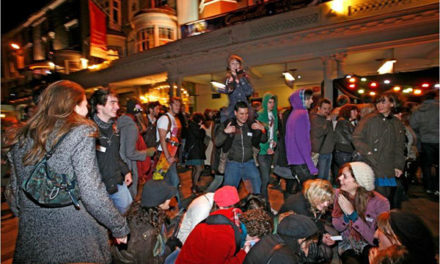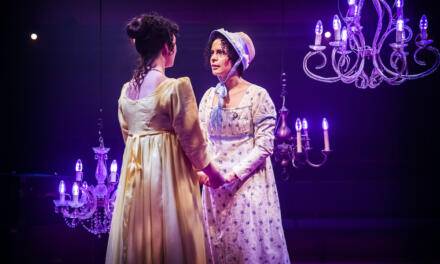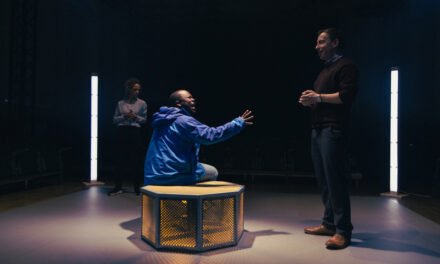For Part 1, click here.
Ana: I really wanted to interview you because I think what is outstanding about your teaching is how you respect all those different ideas of theatre. That is what I experienced with you at the Obrador. We were ten writers from ten different countries, working together for one week. Still, you guided us during the workshop in a dialogue so that each one felt respected and understood. You stimulated us and coached us to do what we wanted, the way we wanted, despite our differences in writing styles, background, and ideas. This is remarkable, it’s what I look forward to achieving as a teacher too.
Simon: You know, it’s very much based in respecting the writer. I feel the same way about 10-year-olds and 30-year-olds. My goal is to help them articulate their project as clearly as possible. Valuing the perspective of the playwright comes from my Royal Court background. Then, I just enjoy different types of theater, I don’t have a type of play that I think it is how plays should be. I love Heiner Muller as much as I love a good English Christmas play by kids. I’m just really excited that those things can exist in my same theater world.
Ana: I agree with you. I think the more unbiased a playwriting teacher is, the more he or she will help their students. Going back to the tools, when you talk about giving playwrights the necessary tools, what are the tools you think a playwright should have? I know this is very relative, but it is meant to be a provocative question.
Simon: It is a tricky question to be simple about. If you consider what you need to make a play, a play is a time-based medium. A play takes place in a location, which is often, not always, a theater. Be it a classical Greek auditorium or a Jacobean playhouse or something else, plays exist to be performed on a site. So there are two main parameters, which are site and time. Having an understanding of them, as well as of character, gesture, and dramatic action is fundamental for me. Fundamental for my work, for sure. I think that if the writer is rejecting Aristotelian dramaturgy, that is, if he or she is a post-dramatic writer, they need to have an understanding of what they are rejecting. They need to have the skills to understand what they are not doing. So for me, narrative, character, dramatic action, structure – that is, form – are very important. I think it is important to have an understanding of how narrative works because the theater is a time-based medium, what distinguishes theater from performance art is the control of the element of time. What distinguishes writing for the theater from writing poetry is when you read poems, the reader controls the time it takes to consume it. In the theater, it is the theater-maker. I would suggest the playwright the responsibility to consider the time of the play, the length of time the play occupies. How we do that is related to a lot of my teaching. Language is also a skill, to a degree. An understanding of what is dramatic language and what is poetic language. I think this is really, really essential.
Ana: Do you use any kind of theory in your classes? When you talk about the understanding of dramatic action, how do you convey this to the writers?
Simon: The advantages and disadvantages of any teacher, like everything in life, is that both come from the same place. My strengths as a teacher have the same origin as my weaknesses as a teacher. My major strength is that my practice is born out of my own experience as a playwright, from the plays that I have written and that have been produced throughout the world. I think this is an advantage: I have written many plays that have been produced by many theaters. The disadvantage of that is that there may be less theoretical rigor. You know, I am part of a theater culture, the UK, in which the playwright is most often produced than assimilated in the academy. My work tends to be more pragmatic than theoretical. So any kind of approach to theory tend to lack rigor, tend to be things that I read while I was trying to write my plays better. That can really come from anywhere. Might come from a book of essays by April De Angelis, or Sarah Kane, or David Mamet, or can come from reading a theater academic, or from reading reviews on visual artists, or musicians, or novelists. There is a lack of theoretical rigor in my approach.
Ana: I think this is totally fine. As you said, the UK, actually the Anglo-Saxon world, tends to be much more pragmatic than other parts of Europe. That is not better or worse, it is just the way it is. If you talk about France or Germany, you have playwrights that are scholars too and they have all this theoretical luggage about their own practice. It’s just a different approach.
Simon: I absolutely agree, and I would go back to what I said before, that a playwright’s approach is a consequence of the industry they are in. So British playwrights tend to be pragmatic because we have our plays produced in theaters. French playwrights tend to be theoretical because they have their plays discussed in classrooms. You know, the French producing culture for new plays is poorer than ours. New plays aren’t produced in France so often.
Ana: Something similar happens in Italy, where the production of new plays is very restricted.
Simon: On the converse, about the theoretical context, plays from Britain don’t tend to get discussed, they tend to get done, and then the danger of that is the baseline assumptions of the marketplace defining the style and the quality of the work. That might not be always good. In the UK is not quite as bad as in the USA, but there is a degree to it, that the caliber of the work, the worth of the play is measured only according to the marketplace. And that could mean that capitalism is dictating art. So you need to be alert to that, I think. Those values are not innocent. There’s no such thing as an innocent value, I think.
This post was written by the author in their personal capacity.The opinions expressed in this article are the author’s own and do not reflect the view of The Theatre Times, their staff or collaborators.
This post was written by Ana Candida Carneiro.
The views expressed here belong to the author and do not necessarily reflect our views and opinions.

















